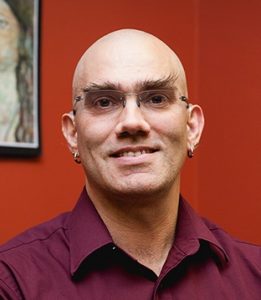 I am pleased to introduce our friend and longtime neighbor Crom Saunders as a guest blogger today. A theatre interpreter and American Sign Language (ASL) master, Crom has a M.A. in Creative Writing and began teaching ASL and Deaf Culture at several universities before getting tenure at Columbia College Chicago, where he is currently Director of Deaf Studies.
I am pleased to introduce our friend and longtime neighbor Crom Saunders as a guest blogger today. A theatre interpreter and American Sign Language (ASL) master, Crom has a M.A. in Creative Writing and began teaching ASL and Deaf Culture at several universities before getting tenure at Columbia College Chicago, where he is currently Director of Deaf Studies.
by Crom Saunders
When I saw Troy Kotsur perform as Stanley in Deaf West Theatre’s A Streetcar Named Desire in 2020, I knew, or at least hoped, he was destined for a distinguished career as an actor.
In the years since, Kotsur has held some acclaimed roles on Deaf West’s stage, and several film appearances, but nothing that garnered nationwide attention until the 2021 film CODA.
CODA was a contender for Best Picture at the 94th Academy Awards, and Troy Kotsur also was nominated for the Best Supporting Actor category. That honor was well deserved in the eyes of many film aficionados and critics. After all, Kotsur has already won several other prestigious awards (such as the Screen Actors Guild Award for Outstanding Performance, plus the Independent Spirit Award and the Critic’s Choice Award for Best Supporting Actor) for his portrayal of Frank Rossi in CODA, a feather in the collective cap of the American Deaf community.
The Oscar nomination was also the first Actor/Actress nomination for a Deaf actor since Marlee Matlin’s win for Best Actress at the 59th Academy Awards in 1987.
Troy’s portrayal of the patriarch of an all-Deaf family, except for the single CODA (Child of Deaf Adults), who makes a living as a fisherman in a small town is excellent in every aspect. His characterization, his expressiveness, and language articulation and delivery all create a very memorable role.
If only the film itself was of the same caliber.
Its win as best Picture notwithstanding, CODA is rife with negative stereotypes of Deaf people and also feel-good pabulum that does no service to the Deaf community or culture.
To begin with, CODA, a remake of the French film La Famille Bélier, relies on the well-worn premise that Deaf people do not appreciate, understand, or access music. This is used as a plot device here to create drama between the CODA character, Ruby, and her Deaf parents.
Ruby is also used as an interpreter in several situations where a professional interpreter would be more appropriate and, indeed, in the case of the doctor’s office, legally required. Again, a plot device to create friction in the family dynamics.
Several of the story scenes in CODA feel dated, more representative of Deaf experiences prior to the 21st century. The Deaf characters are at times portrayed as ignorant and bumpkins, even in contrast to the other small-town residents. The American Deaf community that has viewed the film with a culturally critical eye, if one takes a look at discussion threads in social media, predominantly are of one mind on this:
CODA is more progressive than many films with Deaf characters in the casting of Deaf actors and actresses for all Deaf roles, and giving American Sign Language the importance it deserves. On the other hand, the story feels quite retro in its representation of Deaf people’s views of the world and where they fit into it.
I don’t always watch the Academy Awards, but I did watch this year — in full support of Kotsur and the cast and director of CODA. I was hopeful (and much more confident) that Kotsur would win Best Supporting Actor for his stellar work.
And he did! His career can only grow from this point, a good thing for Kotsur himself, but also for audiences everywhere who can appreciate his skill. And by now you know that CODA won best picture, too. My hope is that win will lead to more modern, Deaf-centered films that have mainstream appeal but also give Deaf people the representation they crave and deserve.
A shorter version of this post was published on the Easterseals National Blog this past Monday.
My Aunt Madeleine who was deaf could dance as good as the best of them. She felt the rhythm through the vibrations in the floor.
Cool! Didn’t know you had an aunt who couldn’t hear. Maybe you’ll write about her sometime….?
I’m so glad you posted this. Some parts of the movie didn’t seem quite right but I thought it was more of an American culture thing. The coroner on Chelsea Murders is deaf. She’s written as a strong leader. At crime scenes, those who have questions walk up and tap her on the shoulder and she pulls her hearing aids out of her pocket and puts them in. And yet, once in a while a co-worker will yell at her out of exasperation. Seems very authentic.
Chelsea Murders? Never heard of it before. Thanks for letting me know they have a deaf actor/actress on the show, so cool.
Thank you, Crom, for your post. I look forward to seeing the movie. I recently became aware of https://www.feelingthrough.com/ because a friend alerted me to it. Sweet short film nominated in 2019 about 2 men, one who is deaf/blind.
Feeling Through. I’ll have to give it a listen!
I’ve read a great deal about CODA and its Oscar nominations recently, but until now nothing that seemed so informed and even-handed. Thank you so much Beth for sharing your blog-space with Mr. Saunders.
Of course! It was an honor to share my blog space with Mr. Saunders, and after I hit the “add comment” button on this, I’ll email him to make sure he sees your thoughtful note here. Thanks, Mel!
Leave a Response